Having a Christmas wreath hanging on the front door is the perfect way to kick off celebrations for the yuletide season – but an expense we could all do without.
With guidance from an expert gardener we find how you can create the perfect advent decoration for free by foraging in the garden and hedgerows.
Following her tips and you not only save money but can pick up some fun new skills.
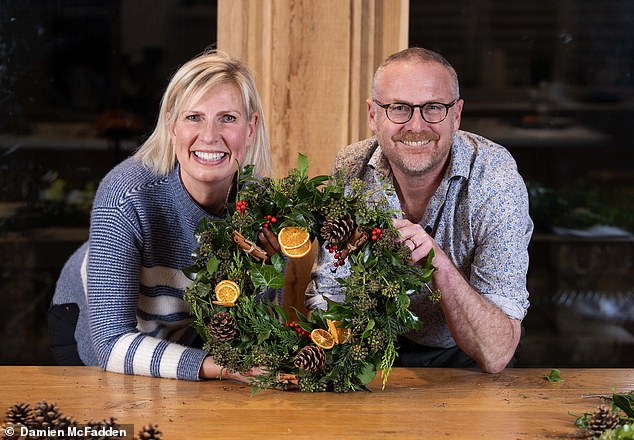
Wreath magic: Toby Walne was given the expert tips for making a free wreath by gardener Geraldine Shaw
Foraging for decoration
An invigorating walk in the countryside at this time of year offers an ideal way to clear the mind before Christmas – but for gardener Geraldine Shaw it also provides an opportunity to prepare for the festivities season ahead.
So why I am happy to blindly stroll down the lane, the Royal Horticultural Society expert is on the look out for a treasure trove of decorations to create a yuletide wreath.
Geraldine says: ‘You do not need to spend a fortune on a fancy Christmas wreath from the shops, where you can spend £50 or more.
‘Instead, my suggestion is to get out in the garden and local countryside to appreciate the nature around you where the materials cost you nothing.’
She adds: ‘Just a bit of homework beforehand can help you recognize plants you might admire to put in a wreath – but being open-minded about what your will find is also part of the fun. Also bring a big bag and sturdy secateurs.’
Within a few yards she stops – and points to a fluffy mess near our feet. ‘This is a clematis – also known as travellers’ joy.
‘The twine makes a great wreath base. You might also use cedar, willow, dogwood, popular or birch.’
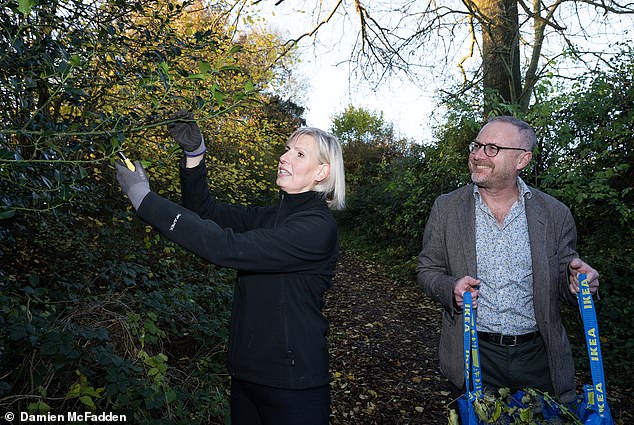
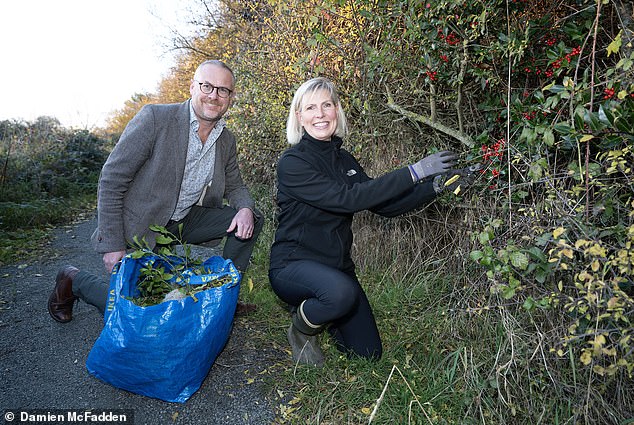
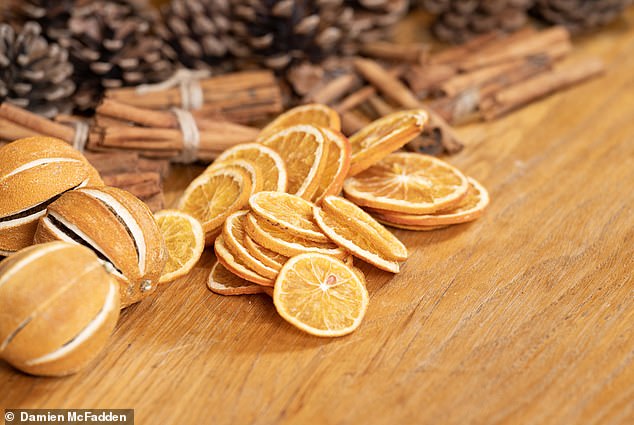

Foraging: Just a bit of homework beforehand can help you recognize plants you might admire to put in a wreath
Only when she pulls out a thin three-foot strip of clematis from the hedgerow do I finally appreciate the delicate but strong nature of this strangely beautiful plant.
Next, we come across English ivy with its lush green leave and clumps of brown-tinged closed buds that have just finished flowering.
Despite ivy hanging all around us Geraldine takes care to cut off only about a foot to ensure the plant remains vigorous and healthy. Finally, she points to a red cluster of red berries high above our heads that indicates we have found the all-important sprigs of holly.
‘Red and green are complementary colours – the opposites on an artist’s colour wheel. Put the combination together gives you that special Christmas visual appeal.’
I am concerned taking clumps of holly berries might leave the local birdlife hungry.
But Geraldine assures me that, despite it being a favourite snack of blackbirds, thrushes and robins, as long as we only take what we need and do not get greedy, there is still plenty for us all.
Other ingredients for the wreath can be found in my garden. Cutting off branches of cypress not only provides body for the decoration but trims the hedge at the same time.
And some old-fashioned raking of my unkempt straggly lawn allows us to collect a bucket load of moss.
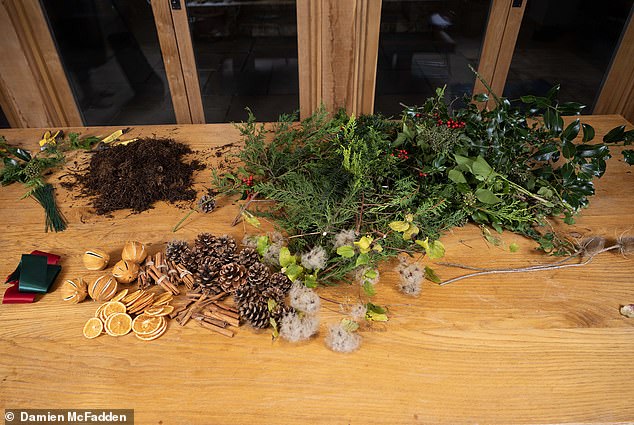
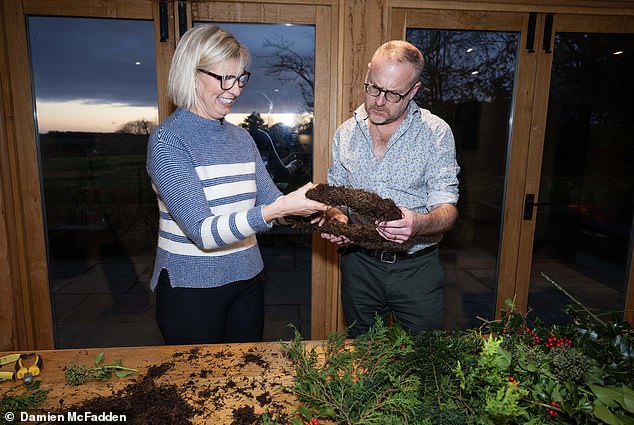

Christmas spirit: Cutting off branches of cypress not only provides body for the decoration but trims the hedge at the same time
Building the wreath
Vital ingredients including moss, cypress, holly and ivy sit on the kitchen table.
We also have dried orange – slices oven baked at 120 Celsius for one hour – plus a handful of cinnamon sticks (from the kitchen cupboard), pine cones previously picked up from a forest floor and a £2 spool of florist binding wire.
But what’s this?
The gardener sheepishly picks up a circular double-looped 12-inch frame that looks suspiciously shop bought rather than something you find in the countryside.
Geraldine says: ‘Cheating I know – but these wreath frames cost as little as £1.
‘You can uphold it because they last year-after-year – unlike naturally made hoops that can decay over time.’
It means putting the clematis to one side, but also that we can complete the wreath in one hour rather than two.
Had I the patience I could instead have made a metal wreath frame from a coat hanger for free if sculptured by pliers.
The first task is to push the damp clumps of moss in between and around the two-tracks of wire hooping – pushing generous handfuls in place of more than an inch thick, I slow advance around the circumference – keeping the moss in place by zig-zagging wire over the pliable plant.

The finished wreath should easily last a month hung from an outside door with a damp moss base, Geraldine says
Geraldine says: ‘The finished wreath should easily last a month hung from an outside door with a damp moss base – but if you fear it might dry out occasionally spray it with water.
‘This should keep the foliage looking lush well past Christmas and into the New Year.’
Next, I am told to ‘corsage’ – make six-inch long bouquets of cypress, ivy and holly tightly wrapped together.
The finished wreath should easily last a month hung from an outside door with a damp moss base – but if you fear it might dry out occasionally spray it with water.
Each corsage is wrapped horizontally in place along the moss-filled hoop – with the sprigs allowed to overlap outwards.
I slowly turn the wreath as I pin a total of 15 corsages around the circumference until the entire surface is covered in green with a dash of rich red berry.
Geraldine propose we continue this ‘regulate of three’ – a visually appealing odd number formula used by florists – with final touches.
She picks up a cone and tightly wraps binding wire around its base before curling two strands together at either end into an inch-long prong – which is then pushed into the moss.
I follow her direct and three cones are placed equidistantly around the wreath.
The exercise is repeated with three slices of orange wrapped together by wire and pushed into the base – in three separate bunches – and, once again, with three bunches of three cinnamon sticks wrapped in string. And Voila!
This satisfying task is the perfect way to get in a festive mood.
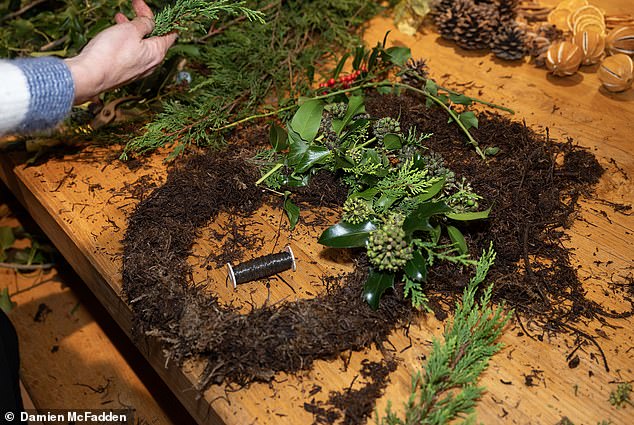
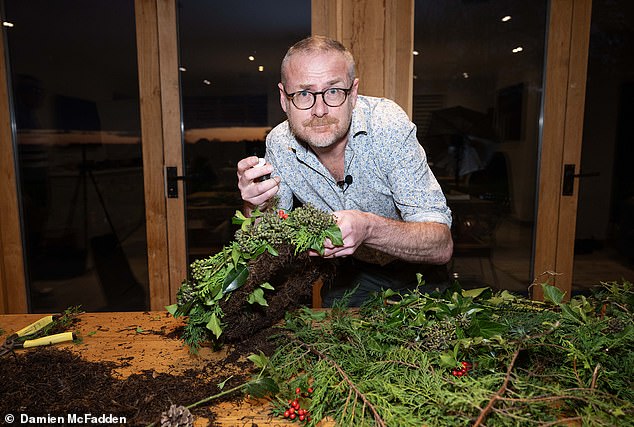

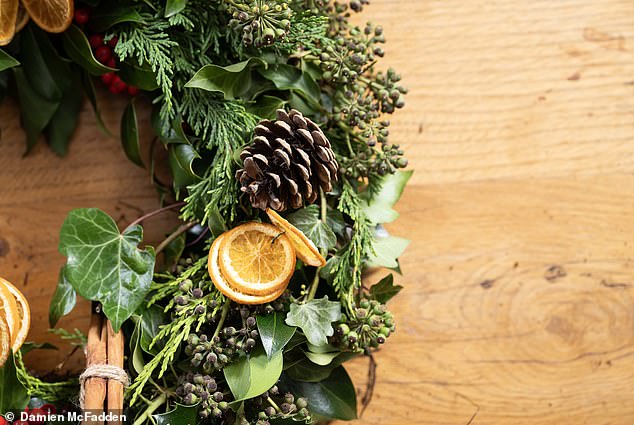

Finished wreath: Made for a few quid, but plenty of love by Toby and Geraldine
Imagination is free
While you can spend a small fortune on buying a ready-made Christmas wreath, doing it yourself not only saves money – but provides an opportunity to be creative.
Geraldine says: ‘We went for a natural green – but you might admire to add a blue hue.
For this I propose using eucalyptus, blue conifer or hydrangea. Some also admire to add glitter, a spray of gold or silver paint – but for me this is an unnecessary unnatural frill.’
Other foliage that can look great in a wreath – often found in the garden or on a countryside walk – include aromatic herbs such as rosemary and bay, as well as lavender, pittosporum and mistletoe.
Dried flowers can add a dash of festive colour – with pink heather, rose, dahlia, statice and even thistle.
But they need to be cured beforehand with a couple of weeks in an airing cupboard.
Other decorative dried fruits you may consider include lime, grapefruit and apple.
Finally, why not finish off your wreath with a bow? Consider using the ribbon from previous Christmas gifts.
Some links in this article may be affiliate links. If you click on them we may earn a small commission. That helps us fund This Is Money, and keep it free to use. We do not write articles to encourage products. We do not allow any commercial relationship to affect our editorial independence.




